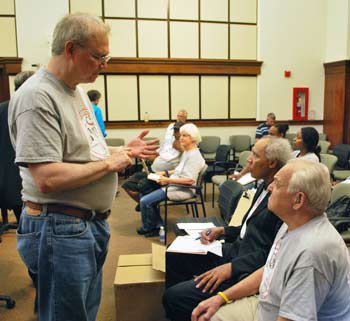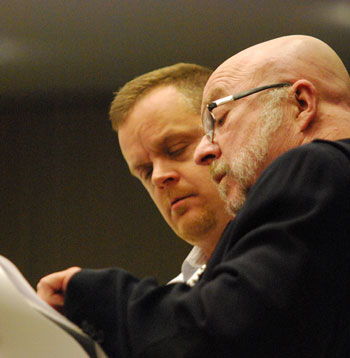County Gets Input on Bonding, Despite Delay
Washtenaw County board of commissioners meeting (July 10, 2013): A non-voting item – the county’s bonding proposal, which is now on hold – was the focus of most public commentary at the board’s July 10 meeting, which also included a previously scheduled public hearing on the topic.

Doug Smith, standing, talks with other members of the Washtenaw Watchdogs before the start of the July 10, 2013 county board meeting. (Photos by the writer.)
Several of those who spoke are affiliated with the Washtenaw Watchdogs. The group has raised concerns about the bonding and is prepared to launch a petition drive that would force the proposal to be put on the ballot for voters to approve.
The bond initiative, publicly proposed in May, was intended to cover unfunded pension and retiree healthcare obligations – for the Washtenaw County Employees’ Retirement System (WCERS) and Voluntary Employees Beneficiary Association (VEBA). The original maximum amount for the bonds had been estimated at up to $345 million. But updated actuarial data resulted in a lower estimate of about $295 million.
However, on July 3, board chair Yousef Rabhi (D-District 8) and county administrator Verna McDaniel issued a joint statement announcing a decision not to put bond-related action items on the July 10 agenda. They cited the need to address unanswered questions, including uncertainty about the state approval process. No date has been set to reschedule action, if any, on the proposal.
In addition to the bond proposal hearing, the board held three other public hearings during its July 10 meeting: on two brownfield plans in Ann Arbor – for 544 Detroit St. and Packard Square (the former Georgetown Mall) – and for annexing land from Scio Township into the village of Dexter to accommodate the expansion of Dexter Fastener Technologies, known as Dextech. All items were subsequently approved by commissioners.
The board also gave final approval to a range of infrastructure projects totaling about $5 million for county government facilities – including redeveloping the Platt Road site in Ann Arbor where the old juvenile center was located. An amendment brought forward by Andy LaBarre (D-District 7) called for creating a 9-member advisory committee to guide the dispensation of the Platt Road site, which is located in his district. Ronnie Peterson (D-District 6) raised concerns about the authority of such a committee. He was assured that the board retains control over whether to act on the committee’s recommendations. Details of how the advisory committee will be appointed, as well as the committee’s formal mission, will require approval from the board at a later date.
In other action, the board gave initial approval to a modest increase in staff for the Washtenaw County clerk/register of deeds office – bumping up a staff position from part-time to full-time – primarily to handle an increase in processing passports and concealed pistol license applications. Commissioners also made several appointments to various boards and commissions, nominated by Rabhi as board chair. He announced he wasn’t yet ready to make nominations to the county’s historic district commission.
Also pushed back was a final vote on a notice of intent to eliminate a lump-sum budgeting approach for Washtenaw County’s court system. Initial approval for this action came on a 5-4 vote at the board’s June 5, 2013 meeting. But on July 10, Alicia Ping (R-District 3) – who had originally brought forward the proposal – asked for postponement until the board’s Oct. 16, 2013 meeting, citing communications she’d had with trial court chief judge Donald Shelton. The vote to postpone was 6-2, with dissent from Dan Smith (R-District 2) and Conan Smith (D-District 9). Rolland Sizemore Jr. (D-District 5) was absent.
In addition to feedback about the bonding proposal, commissioners heard from leaders of two nonprofits – Washtenaw Success by 6 Great Start Collaborative and Interfaith Hospitality Network-Alpha House – about the need to support human services funding. Uncertainty about the upcoming budget has caused concern among nonprofits that have been historically funded by the county.
Also during public commentary, two members of the Church of the Good Shepherd in Ann Arbor thanked commissioners and staff for quickly restoring domestic partner benefits to nine county employees, following recent court rulings that enabled the county to reinstate such benefits.
Facial hair got a minor mention at the July 10 meeting, when Rabhi told Dan Smith: “Your beard is epic – congratulations on it.” Smith used the opening to mention that he’s growing the beard for his role as Lazar Wolf in the upcoming production of “Fiddler on the Roof.” The show runs from July 19-21 at the Whitmore Lake High School Theater. He received a round of applause from the board. Peterson joked that he was glad for the explanation – Peterson had been prepared to reach out to Smith with the name of his barber. [Full Story]




